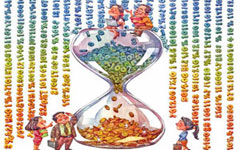Since its inception, the Internet has always been closely associated with the production, distribution and consumption of news. Journalism is often said to be history in a hurry, and the Internet has become one of the very first "gatekeepers" of information about events and people that might go down in history. Nothing is as old as yesterday's news, and so yesterday's news may already be tomorrow's history.
While historians have merely scratched the surface of the topic by making references to the Internet as a source of historical research, there is little said about how the Internet will influence the way history is recorded in the future.
|
 |
 |
The media at any time knowingly or unknowingly put the spotlight on certain events and people, thus setting the "attention agenda" for the audience. This accounts for why historical scholarship in the age of the traditional media was far less diverse than it is today.
In this sense, the Internet has truly revolutionized and democratized the making and recording of history. According to scholars who advocate "citizen journalism", theoretically speaking everyone who can access the Internet in some way can be a virtual "journalist" publicizing at any moment the "news" that his or her whims dictate. Actually, this is an age of "over recording" and "over discussing", as social network sites go into laborious detail about the daily trifles of people's lives. If measured against the established criteria for history, is such information significant? Maybe, probably not, but in the Internet era it is competing for historians' attention with what is truly worth recording, researching, and writing.
In the early 1960s, the US historian Daniel Boorstin recognized the use and abuse of news-making and event-making, introducing the concept of "ps
